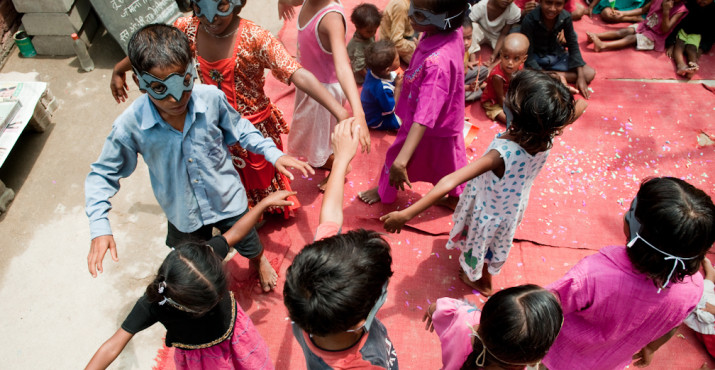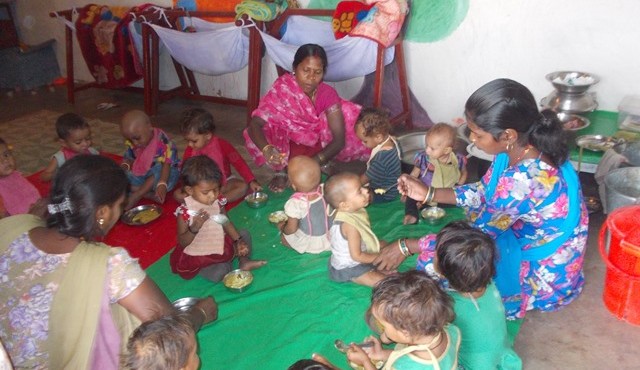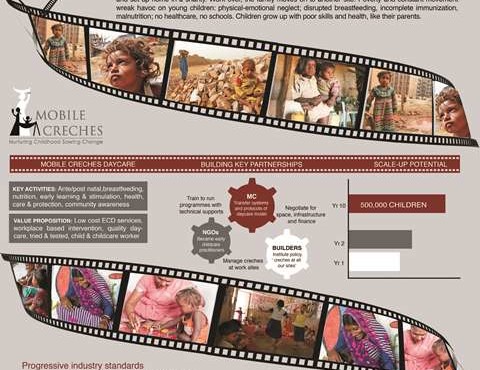Innovation Summary
 The construction industry is the second largest employer in India with almost 30 million workers, two thirds of whom are unskilled and more than half of whom live below the poverty line [1].
The construction industry is the second largest employer in India with almost 30 million workers, two thirds of whom are unskilled and more than half of whom live below the poverty line [1].
The children of these migrant workers are irrelevant to the businesses and invisible to the governments. Maternity support and benefits to women construction workers and crèches (daycare centres) for their young children at the construction sites barely exist despite a clear need for both. As a result, India witnesses 3 million children of migrant workers at its construction sites uncared for and their rights violated. These children do not have access to adequate health care services, nutrition, safe environment, basic simulation, nurturing or even breast feeding.
Mobile Crèches (MC) proposes to ‘Save Brains’ by demonstrating the feasibility, effectiveness and scalability of a holistic, workplace-based childcare program for young children of migrant construction workers, at scale, through key partnerships. The innovation will build on sound child development principles and practices, for a marginalized group, to create social and economic value for a multitude of players. The final goal is scale up through state programmes and other NGOs
Gallery
Impact
Expected Impact:
- 5,000 children under 6 year old will receive comprehensive day care services at the centres
- 3,000 underweight children will have improved nutrition status and growth after 3 months at a mobile crèche
- 4,500 under 6 children will receive age appropriate immunization from the centres
The crèche didi feeds me, keeps me clean, sings me songs and tells me stories while Amma is away.
--Child at a crèche
Innovation
The Innovation is the tripartite engagement of construction companies, NGOs and Mobile Creches. The primary focus of the project will be building a management framework to run the crèches, in partnership with current and new builder partners and service-providing NGOs, and transferring the business operations. The project aims to demonstrate the opportunity to build capacities of NGOs to carry out the workplace-based early childhood care and development (ECCD) intervention – and widening their horizons in the process – in a 2 year time-frame, for purposes of further scale up. The unique feature is building NGOs’ capacities to sustain funding and the builders’ buy-in for a policy of crèches at their sites.
This innovation will address the ‘whole child’ and bring all primary stakeholders together, including:
- The Community, for sustained involvement
- A cadre of childcare workers, for delivery of services
- NGOs, as ECCD practitioners
- The building industry at different levels
- The Labour Welfare Department of Government, to generate demand and ensure compliance
- The Builder Associations and industry leaders, to institute policy and generate peer pressure
MC will engage with communities to help develop better childcare practices in the crèches and will draw in academia to bring in assessment tools and capture impact within a short time window. MC shall also work to support the development of new industry practices for childcare at construction sites.
MC will negotiate with construction builders for space, infrastructure and partial finance for childcare programs at their project sites. MC will transfer crèche operating processes to other credible NGOs and provide them monitoring and technical support. This will increase the number of players who are able to deliver these services efficiently and thereby will also increase the outreach. The innovation also aims to make the crèches economically worthwhile for end-users, both now and in the future. This requires participation of the community and conviction of construction companies that the return on investment accrues not only in increased labour productivity, but also in external economies of child-friendly practices, healthy families and nation building in the long run. The incentive structure needs to keep all stakeholders engaged to ensure long-term financial sustainability.
The idea is bold as we will be creating new ECCD practitioners in the years ahead – builders on the demand side and NGOs on the supply side – to independently run and manage crèches at construction sites.
Collaboration
Funders:
- Grand Challenges Canada – Canada
- Comic Relief (Dasra Foundation) – UK
- Different corporates like KPMG, PNBHFL, Rossell Ltd., etc. – India
- Builders/Contractors providing part contributory support from India (majority from Delhi NCR & 2-4 other cities/towns)
Key Partners:
- Navsrishti , Delhi
- SAAKSHI , Delhi
- VHAP , Punjab
- SAATH, Ahmedabad
- NIPUN, Delhi
- RASTA, Delhi
Implementation
Expected drivers:
- Successful training
- Smooth association with builders
- Strong NGO partners
- A strong research study
Expected Challenges:
- Financial Constraints from the builders/contractors
- NGO partners unable to sustain the pressure of running centres because of lack of sound management and administrative backup.
Continuation
In order to transition to scale, MC will improve child development by training NGOs to deliver their well-established free holistic childcare program. By transferring knowledge, skills and systems for entire business of operations to NGOs on how to provide childcare facilities for children of poor migrant workers, MC will increase the number of groups able to deliver services and the number of children served, as well as support new industry standards. MC will engage the communities for better childcare practices and work with an academic team to assess impact on child development outcomes.
Evaluation Methods
Both quantitative and qualitative research methodologies will be used in the evaluation process. Overall, the credibility of the study will be enhanced through data triangulation method, which entails gathering data through several sampling strategies so that slices of data at different times and social situations, as well as on a variety of people, are gathered for cross verification.
One research study and an appreciative documentation will be conducted to address the evaluation questions. The research study will investigate the impact of the Mobile Creches’ intervention on young children and their families. The appreciative documentation will focus on the process of business transfer by Mobile Creches and its effect on the quality of early childhood services provided by NGOs.
Finally, existing documents and interviews with MC personnel will be used to describe the process of developing relationships with builders to launch day care centres.
Impact of Innovation
Early intervention comprising adequate/appropriate nutrition, safety, protection, love, care and stimulation, has been scientifically proven to have made a significant difference in the health trajectory, learning capacities and social behaviors for the adult.
MC will provide holistic childcare to 4,500-5,000 children under 6 and 13,000 community members at 34 centres over two years. This will be in partnership with 10-12 builders, 10-15 service-providing NGOs, and approximately 150 NGO workers trained by MC in Delhi-National Capital Region and 2-4 other cities. The project includes 4 daycare centres in the proof-of-concept mode to refine process, train NGO workers and bring in new partners, working with 2-4 other builders and covering another 800 children under 6 years and 2,880 community members.
It is a quality care programme, expected to yield the following:
- 100% children targeted get provision to health, nutrition, learning, care & protection benefits
- 90% of children staying with us for minimum two months & above get age-appropriately immunized
- 60% of children staying with us for minimum of three months & above are able to maintain and improve their nutritional grade status
- 60% of children who attend the program for minimum three months and above are able to gain in learning capacities and appropriate social behaviors
Cost:
The Day Care Model addresses children´s needs in a holistic fashion and is a proactive, cost effective strategy. The total cost, approximates $1/child/day and the quality of the services provided within the short window of opportunity have had a positive effect on children.
References
- http://mobilecreches.org/pdf/Distress%20Migration%20_%20Identity%20and%20Entitlements(1).pdf
Resources
-
Research
-
Reports
-
Instruments and Batteries
-
Early Childhood Education Quality Assessment Scale (ECEQAS). Classroom Environment for Preschools. Adapted version will be used for infants and toddlers
-
School Readiness Instrument (SRI). School readiness of children (4 to 5 years)
-
Early Learning Development Guidelines (ELDGs) as Observation Checklist. Child outcomes (6 months to 5 years)
-
Household survey. Family profile,
-
-
Multimedia





